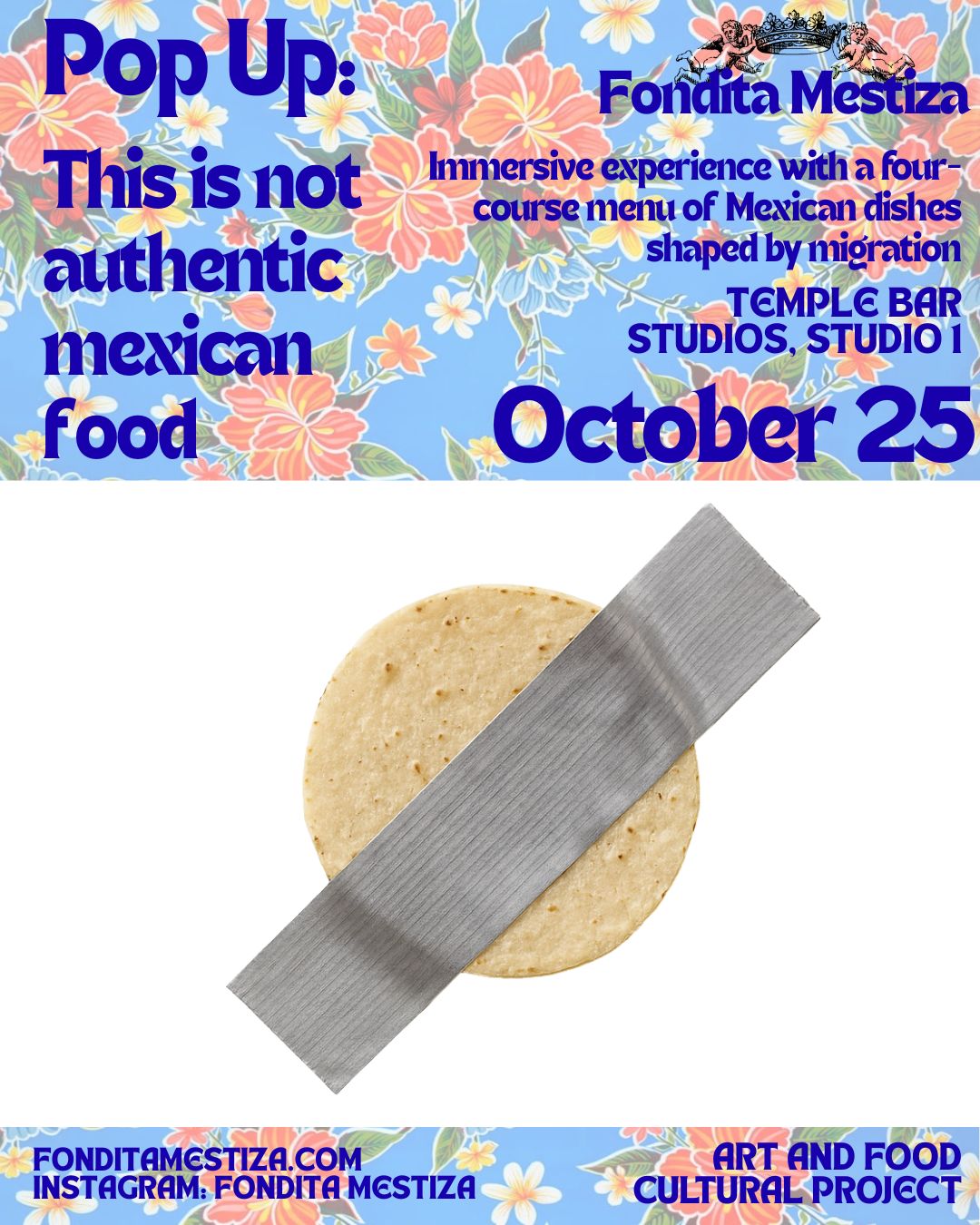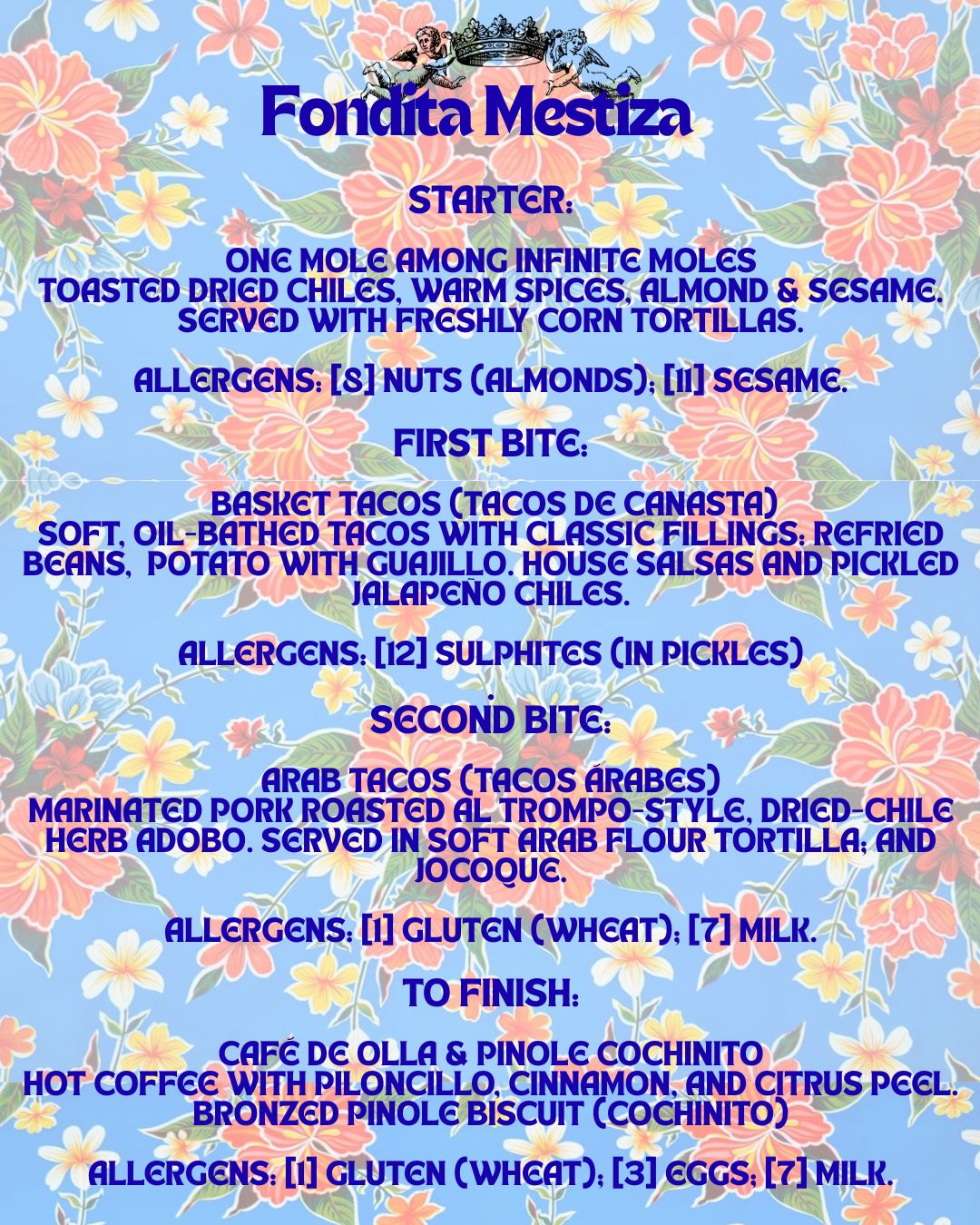Fondita Mestiza Pop-up: This is not authentic mexican food
Fondita Mestiza Pop-up: This is not authentic mexican food
Couldn't load pickup availability
Fondita Mestiza Pop-up: This is not authentic mexican food
Immersive experience with a four-course menu of Mexican dishes shaped by migration.
Does the Mexican cuisine exist as a single, fixed thing? To affirm that it does installs a dominant narrative that decides what counts as “authentic” or “traditional.” Institutions, brands, and restaurants often lean on those words to reassure diners that “this is how it’s eaten in Mexico.” But that promise narrows a living tapestry: it prescribes how something should taste and should be cooked, and it erases regional, historical, and class differences.
Taste—following Pierre Bourdieu—is social and cultural; it forms in the contexts we inhabit, the places we frequent, the menus we can access. Mexico’s valleys, deserts, mountains, and coasts hold a vast diversity of ecosystems and culinary knowledge woven by Indigenous peoples over centuries. To this horizon we add internal and transnational migrations that, far from “contaminating” an essence, expand and transform the kitchens.
This immersive experience starts from a simple premise: many dishes we call “Mexican” exist thanks to flows of people, techniques, and ingredients. We present a four-course menu that invite us to see mestizaje—cultural mixing—not as loss but as a fertile field of crossings, negotiations, and affections. We question the promise of “authenticity” and show how the many Mexicos—inside and beyond the territory—are cooked in motion.
The proposal activates in the Irish context, in dialogue with local landscapes, seasonality, and the migrant memory that cooks here today. At the end, each guest can take home a poster printed live with a tortilla press: a performative gesture that shifts a domestic tool into the print workshop and leaves a unique imprint, like each dish and each migratory path.
Four-course menu: ¿what are you going to eat?
1) One Mole among Infinite Moles
Context. From the pre-Hispanic chilmolli to contemporary moles, this universe is constantly rewritten. To native chiles and seeds were added, via colonial routes and migration, almonds, sesame, spices, sugar, fruits, and roasting/grinding techniques that travelled from the Iberian Peninsula, the Middle East, and Asia. Every mole is modern because it is both historical and current: a recipe always in version.
On the table. A seasonal mole highlighting layers of roasts and spices, served with freshly handmade tortillas.
2) Basket Tacos: from the indigenous communities to the Big City
Context. In Mexico City in the late 19th and early 20th centuries, tacos de canasta fed workers and office clerks: a covered basket, a street corner, an accessible price. This urban gesture coexisted with a discourse that linked maize to “poverty” while elites looked to European cuisines. Yet basket tacos consolidated a distinctive technique—the warm “oil-bathing”—and a popular repertoire that dignifies the everyday.
On the table. Soft, melty tacos with classic street fillings (refined beans or smashed potatoes), served with green salsa and pickles.
3) Arab Tacos: Genealogies of the Rotating Spit
Context. In Puebla, Lebanese and Syrian migration in the 20th century brought the vertical roast (shawarma) and wheat breads that sparked the taco árabe. Its most famous descendant, the taco al pastor, layers chile-based marinades and local techniques. This is mestizaje in plain sight: wheat and maize, Levantine spices and Mesoamerican chiles, the trompo’s spin and Mexican street life.
On the table. A plant-forward reinterpretation of the taco árabe: pulled pork marinated and roasted al trompo-style, served in a soft Arab-style flatbread, with a dried-chile herb adobo, jocoque, and onions.
4) Café de Olla and Pinole “Cochinito”
Context. Café de olla—coffee brewed in a bit pot with piloncillo (unrefined cane sugar) and cinnamon, gained fame as an energising, hospitable drink during the Mexican Revolution. The cochinito—a little pig-shaped sweet bread—was born from the meeting of European ovens and popular imagination; here it converses with pinole (toasted, ground maize), an Indigenous staple that thickens atoles and sweetens snacks.
On the table. Café de olla (piloncillo, cinnamon, citrus peel) and a cochinito made with pinole: a bronzed, crisp, perfumed biscuit.
What’s Included
-
Four-course tasting
A guided menu that traces migratory lineages in Mexican cooking: - One Mole among Infinite Moles
- Basket Tacos (tacos de canasta)
- Arab Tacos (tacos árabes)
- Café de olla with a pinole cochinito (biscuit)
Event Dates & Location
📍 Location: Temple Bar Studios, Studio 1
🗓️ Available Dates and Hours:
October 25
Two slots:
12PM to 2PM
3PM to 5PM
Ticket Information
🎟 Regular price: €77
🔥 Early Bird Phase 1: €61.60
🔥 Early Bird Phase 2: €68.00
💳 Booking Confirmation: Once payment is processed, you will receive a confirmation email with your digital ticket and event details.
Dietary & Accessibility Information
Vegetarian options available – Please inform us at least 72 hours in advance.
If you have any dietary restrictions, let us know when booking.
Accessibility: The venue has wheelchair accessibility.
Additional Details
Event Duration: Approximately 2 hours
Getting Here: Temple Bar Studios, Studio 1
Terms & Policies
Tickets are non-refundable as we are a small business and prepare the food in advance, but they are transferable if you cannot attend.
Arriving on time is important to enjoy the full experience.
📩 Questions? Contact us at fonditamestiza@gmail.com




